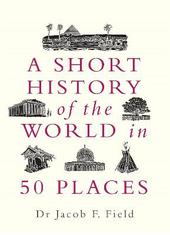
|
A Short History of the World in 50 Places
Hardback
Main Details
| Title |
A Short History of the World in 50 Places
|
| Authors and Contributors |
By (author) Jacob F. Field
|
| Series | A Short History of the World |
|---|
| Physical Properties |
| Format:Hardback | | Pages:288 | | Dimensions(mm): Height 178,Width 129 |
|
| Category/Genre | World history
Historical geography |
|---|
| ISBN/Barcode |
9781789291971
|
| Classifications | Dewey:909 |
|---|
| Audience | |
|---|
| Illustrations |
Maps, photographs and illustrations throughout
|
|
Publishing Details |
| Publisher |
Michael O'Mara Books Ltd
|
| Imprint |
Michael O'Mara Books Ltd
|
| Publication Date |
2 April 2020 |
| Publication Country |
United Kingdom
|
Description
A Short History of the World in 50 Places provides a new perspective on the grand sweep of our planet's story, from the prehistoric era to the early twenty-first century, taking readers from the Olduvai Gorge in Tanzania, where fossil evidence of over two million years of human evolution was uncovered, to the CERN laboratory in Switzerland, where cutting-edge contemporary technologies such as the World Wide Web were invented and developed. This book details fifty of the most important places in human history, taking in a great variety of sites, some well-known and others far more surprising, from every continent in the world. Each place brings us closer to major events such as humanity's expansion out of Africa, the Industrial Revolution and the globalised economy, the World Wars, and the rise and fall of communist regimes, showing the place's influence on not just politics, but on the economy, culture, religion and society. Even the most humble of locations can witness the turning of history.
Author Biography
Jacob F. Field PhD is a historian and writer who was a contributor to 1001 Historic Sites and 1001 Battles. He is the author of One Bloody Thing After Another: The World's Gruesome History, and We Shall Fight on the Beaches: The Speeches That Inspired History, both published by Michael O'Mara Books. He studied for his undergraduate degree at the University of Oxford, and then moved to Newcastle University for his PhD, where he completed a thesis on the Great Fire of London. He then worked as a research associate at the University of Cambridge.
|